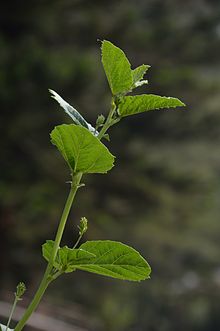| Cullen corylifolium | |
|---|---|

| |
| Scientific classification | |
| Kingdom: | Plantae |
| Clade: | Tracheophytes |
| Clade: | Angiosperms |
| Clade: | Eudicots |
| Clade: | Rosids |
| Order: | Fabales |
| Family: | Fabaceae |
| Subfamily: | Faboideae |
| Genus: | Cullen |
| Species: | C. corylifolium |
| Binomial name | |
| Cullen corylifolium (L.) Medik. | |
| Synonyms | |
| |
Cullen corylifolium, synonym Psoralea corylifolia, (babchi) is a plant used in Indian and Chinese traditional medicine. The seeds of this plant contain a variety of coumarins, including psoralen.
Etymology
Corylifolium comes from similarity of the leaves to those of Corylus, a genus of tree in northern world regions, such as Sweden.
Description
Cullen corylifolium grows 50–90 cm tall and is an annual plant. It has pale-purple flowers in short, condensed, axillary spikes. Its corolla is pale purple. Flowers one-seeded fruits. The most distinctive feature is the occurrence of minute brown glands which are immersed in surface tissue on all parts of the plant, giving it a distinctive and pleasant fragrance.
Habitat and distribution
Cullen corylifolium is native to north-east tropical Africa, the southern Arabian Peninsula, and tropical and subtropical Asia, including India and Sri Lanka. It was occasionally cultivated in Arabia for its supposed medicinal properties.
Chemical constituents
Cullen corylifolium extract contains numerous phytochemicals, including flavonoids (neobavaisoflavone, isobavachalcone, bavachalcone, bavachinin, bavachin, corylin, corylifol, corylifolin and 6-prenylnaringenin), coumarins (psoralidin, psoralen, isopsoralen and angelicin), meroterpenes (bakuchiol, and 3-hydroxybakuchiol).
Use in traditional medicine
Cullen corylifolium, or bu gu zhi 补骨脂 in traditional Chinese medicine, is an herb used as a therapy for several disorders, such as treatment of lichen planus by psoralen extract combined with sunlight exposure.
References
- ^ "Cullen corylifolium (L.) Medik". Plants of the World Online. Royal Botanic Gardens, Kew. Retrieved 2023-04-29.
- ^ G. Miller, Anthony; Morris, Miranda (1988). Plants of Dhofar. Oman. pp. 174–5. ISBN 978-071570808-8.
{{cite book}}: CS1 maint: location missing publisher (link) - Zhao LH, Huang CY, Shan Z, Xiang BG, Mei LH (2005). "Fingerprint analysis of Psoralea corylifolia by HLPC and LC-MS". J Chromatogr B. 821 (1): 67–74. doi:10.1016/j.jchromb.2005.04.008. PMID 15905140.
- Cheng, Xia (2001). Easy Comprehension of Traditional Chinese Medicine: Chinese Materia Medica, Canadian Institute of Traditional Chinese Medicine, p343.
- Atzmony, L; Reiter, O; Hodak, E; Gdalevich, M; Mimouni, D (2016). "Treatments for cutaneous lichen planus: A systematic review and meta-analysis". American Journal of Clinical Dermatology. 17 (1): 11–22. doi:10.1007/s40257-015-0160-6. ISSN 1175-0561. PMID 26507510. S2CID 3711429.
| Taxon identifiers | |
|---|---|
| Cullen corylifolium |
|
| Psoralea corylifolia | |
This Faboideae-related article is a stub. You can help Misplaced Pages by expanding it. |